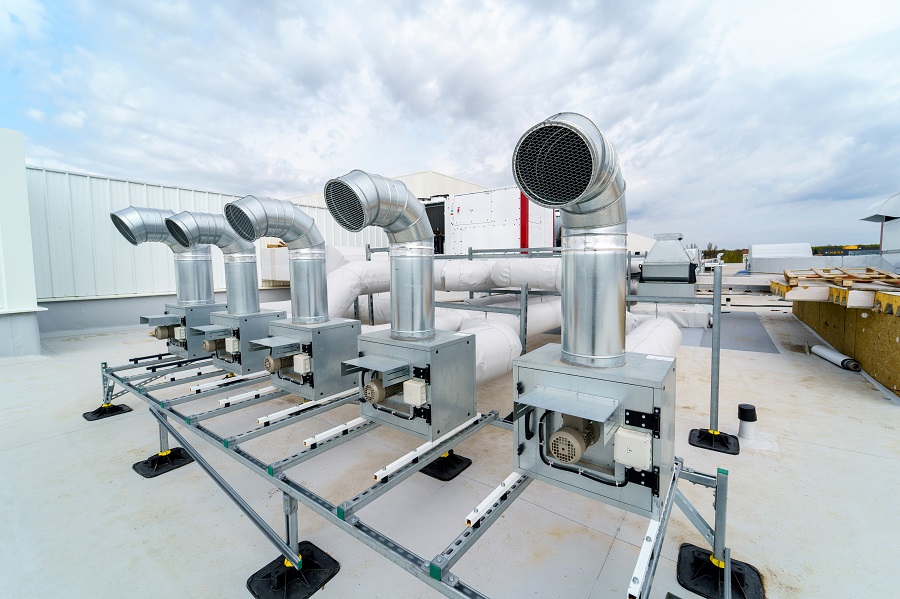The Application of Evaporative Systems for Industrial Air Quality

If you're looking to maintain a healthier, more productive industrial space, you can't ignore how crucial air quality is. Evaporative cooling systems offer a smart way to tackle heat and airborne contaminants at the same time. With impressive energy savings and the ability to bring in fresh, filtered air, these systems might just transform how you manage your facility's environment. But what exactly makes evaporative coolers stand out in demanding industrial settings?
Understanding Evaporative Cooling Technology
Evaporative cooling technology is a method used to cool and clean industrial air by drawing hot, dry air through a medium saturated with water.
The process of evaporation occurring in this medium can reduce temperatures by up to 30°F while simultaneously filtering out dust and pollutants.
In direct evaporative cooling systems, the hot air is passed directly through the evaporative media, which has the effect of improving air quality and increasing humidity levels.
In contrast, indirect evaporative cooling systems use a heat exchanger to cool the air without adding moisture, making them suitable for maintaining air quality in humid conditions.
This evaporation process naturally cleans the air and can reduce energy consumption by up to 70% when compared to more traditional cooling methods.
Types of Evaporative Cooling Systems Used in Industry
Various cooling systems that utilize evaporation technology are employed in industrial settings, each offering specific benefits based on the climate and application requirements.
Direct evaporative cooling systems use wet cooling pads to achieve up to 90% efficiency in hot, dry environments.
Indirect/direct evaporative cooling systems incorporate a heat exchanger to cool air without increasing humidity levels, making them suitable for humid regions.
Advanced systems that combine both methods, often referred to as two-stage evaporative cooling, can enhance efficiency to approximately 115%.
Industrial evaporative coolers equipped with rigid media can reach nearly 98% efficiency, positioning them as effective solutions for industrial cooling needs.
The evaporation process is a critical component in optimizing cooling solutions for industrial applications.
How Evaporative Cooling Enhances Indoor Air Quality
Industrial facilities often face the challenge of maintaining clean air while ensuring efficient cooling.
Evaporative cooling systems address this by introducing 100% outdoor air into the facility, as opposed to recirculating indoor air.
This process involves drawing outdoor air through saturated media, which naturally filters out dust, pollen, and various contaminants.
As a result, air quality is enhanced as the filtered air is distributed throughout workspaces, effectively reducing the presence of smoke, odors, and airborne particles.
The use of industrial evaporative cooling systems helps prevent the accumulation of harmful particles, thereby contributing to healthier working conditions.
Key Benefits of Implementing Evaporative Coolers in Factories
Implementing evaporative coolers in factories offers several practical benefits related to air quality and energy efficiency.
These cooling systems provide effective air cooling while filtering out dust, pollen, and airborne contaminants, contributing to a safer industrial environment.
By delivering 100% fresh outside air, evaporative coolers help to reduce indoor pollutants and odors, as well as minimize suspended dust on the shop floor.
Additionally, they can reduce energy consumption by up to 90% compared to traditional cooling methods, which can lead to cost savings while maintaining effective cooling of the factory space.
Improved air circulation through evaporative cooling can support regulatory compliance and may enhance worker productivity in warm environments.
Industrial Applications and Case Studies of Evaporative Cooling
Evaporative cooling systems have been incorporated by various industries to address specific air quality and temperature control needs.
In warehouses and storage facilities, these systems are employed to cool the air, maintain appropriate humidity levels, and protect sensitive inventory from potential damage. In the food and beverage sector, evaporative cooling is utilized to prevent spoilage and ensure that hygiene standards are met. Glass and manufacturing industrial buildings use these systems to lower air temperatures, thereby preventing equipment from overheating and improving working conditions for employees. In the textile and paper industries, evaporative cooling is essential for maintaining optimal humidity levels, which helps reduce static electricity and enhances operational efficiency.
Essential Features to Consider When Selecting an Evaporative Cooler
When selecting an evaporative cooler for industrial purposes, it's important to focus on features that significantly influence efficiency, durability, and adaptability. It's advisable to consider systems with rigid-type cooling media, as they can achieve cooling efficiency levels of up to 98%.
Stainless steel housings are recommended for their ability to provide robust protection against environmental elements. An open-water distribution system is beneficial as it ensures uniform cooling and enhances air quality.
Advanced control features, such as variable air volume, temperature, humidity, and pressure sensors, are essential for optimizing energy savings. Choosing between portable and ducted systems should depend on the specific cooling requirements of targeted zones within the industrial setting.
The appropriate selection of evaporative coolers can maintain operational performance, reduce energy expenditures, and offer long-term reliability in industrial applications. For proven reliability and industry-leading performance, explore evaporative cooling solutions and industrial humidification by MeeFog. These products are engineered to deliver efficiency, durability, and long-term value for your facility.
Conclusion
By choosing evaporative cooling systems for your industrial space, you’re not just cooling the air—you’re actively improving indoor air quality, reducing energy costs, and creating a healthier workplace. These systems filter out dust and contaminants while using far less energy than traditional methods. If you want to boost productivity, support sustainability, and stay compliant with regulations, it’s clear that evaporative coolers offer effective, practical solutions for your facility’s air quality and overall environment.
